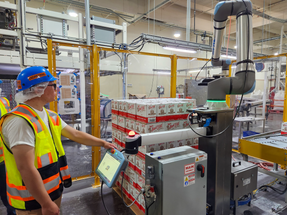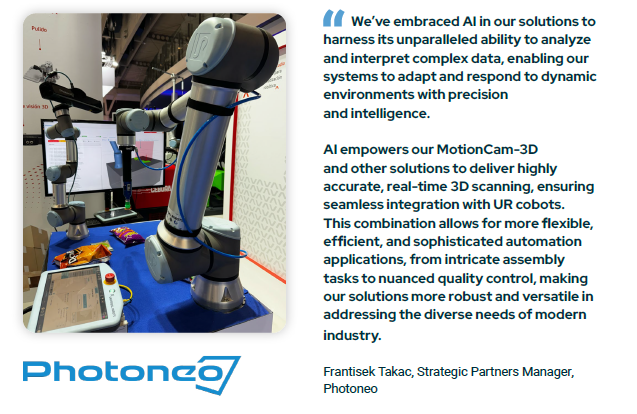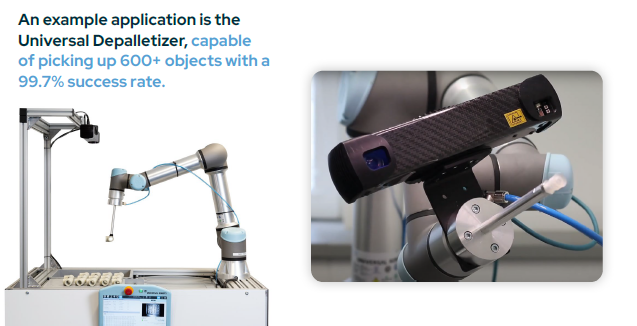Jul 25th 2024
The Impact of AI-Powered Collaborative Robots on Efficiency and Innovation
In the rapidly evolving landscape of industrial automation, collaborative robots, or cobots, are emerging as game-changers, especially when integrated with advanced AI technologies. These AI-powered cobots are not only transforming workplaces by taking on cognitively demanding tasks and working alongside humans but are also making automation more accessible and cost-effective.
According to a survey conducted by Universal Robots, AI and machine learning are regarded as the most important technologies by decision makers in manufacturing companies, with over 50% of respondents already using these technologies and more than 47% planning to invest in them in 2024 and 2025.
A recent survey by Capgemini revealed that over half of the manufacturing companies have already implemented AI and machine learning solutions within their operations. The report highlighted that these technologies are being used to enhance various aspects of manufacturing, including predictive maintenance, quality control, and supply chain optimization. Furthermore, the survey indicated that 47% of the respondents plan to increase their investments in AI and machine learning over the next two years, aiming to leverage these technologies to gain a competitive edge and drive innovation.
Industry analysts from McKinsey & Company have emphasized the growing importance of AI and machine learning in the manufacturing sector. Their research shows that these technologies are pivotal in transforming manufacturing processes, improving efficiency, and reducing costs. Additionally, a survey conducted by PwC found that a significant number of manufacturing executives consider AI and machine learning as critical to their strategic planning. The survey results revealed that over 50% of the respondents are currently utilizing these technologies, while nearly half are poised to ramp up their investments in 2024 and 2025 to stay ahead in an increasingly competitive market.
The integration of AI into robotics, especially in collaborative applications, is transforming workplaces by enabling robots to handle cognitively demanding tasks that were once the sole domain of human workers. This advancement allows robots to work alongside humans, enhancing productivity and efficiency. AI-powered robots can analyze data, learn from their environment, and make autonomous decisions, which complements human efforts by taking over repetitive, hazardous, or highly technical tasks. This synergy not only improves overall operational effectiveness but also creates more attractive job opportunities for human workers. Employees can now focus on higher-level tasks that require creativity, problem-solving, and critical thinking, leading to more fulfilling and engaging work environments. As a result, the collaboration between AI-driven robots and humans is fostering a new era of innovation and job satisfaction in various industries.
Collaborative robots enhanced with AI solutions are significantly lowering the barriers to automation for various industries. These advanced systems are designed for ease of use, allowing businesses to install and operate them with minimal disruption, even in complex and dynamic environments. Unlike traditional industrial robots, which often require extensive programming and setup, AI-driven cobots can learn from their surroundings and adapt to new tasks through intuitive interfaces and machine learning algorithms. This flexibility makes it possible for companies to integrate automation without the need for specialized expertise or extensive reconfiguration of existing processes, streamlining the adoption of automation technologies across diverse applications.
Additionally, the adaptability of AI-enhanced cobots translates into considerable cost savings for businesses. Traditional automation systems often necessitate substantial upfront investments in infrastructure and ongoing maintenance to accommodate specific tasks and workflows. In contrast, cobots can be seamlessly integrated into existing operations, adjusting to varying conditions and requirements without significant modifications. This capability reduces the need for costly customizations and downtime associated with retooling and retraining. As a result, companies can achieve faster return on investment and more agile production capabilities, making automation a viable option for smaller businesses and those in industries with rapidly changing demands.
Universal Robots, a leading provider of collaborative robots, is at the forefront of revolutionizing industrial automation by forging strategic partnerships with AI pioneers. These collaborations are crucial for developing cutting-edge cobot applications that drive operational excellence and competitive advantage across diverse industries. By integrating advanced AI capabilities into their cobots, Universal Robots enables businesses to automate complex, repetitive tasks with unprecedented precision and efficiency. This not only enhances productivity but also allows companies to allocate human resources to more strategic and value-added activities. Moreover, the seamless integration of AI-driven cobots into existing workflows minimizes downtime and maximizes return on investment, making it easier for industrial companies to embrace the future of automation. By choosing Universal Robots, businesses can stay ahead of the curve, harnessing the power of AI to transform their operations and achieve sustained growth in a rapidly evolving market.
How does AI technology benefit the logistics industry?
- Efficient Order Picking: AI, in conjunction with collaborative robots like the UR20 cobot and advanced vision technology, enables autonomous order picking with total autonomy and maximum accuracy. This technology optimizes order picking processes and enhances order fulfillment in warehouses and logistics centers.
- Adaptation to Dynamic Environments: AI allows robots to adapt to dynamic environments with precision, making it possible to automate complex tasks like bin-picking varied objects and obstacle avoidance. This capability is particularly beneficial in unstructured environments where traditional automation has been challenging.
- Enhanced Flexibility and Efficiency: AI-powered solutions streamline logistic tasks by recognizing various items, including transparent and translucent ones, and instructing robots on where and how to pick them up. This optimization leads to more efficient and flexible logistics operations.
- Real-Time Adjustments: AI technology enables real-time adjustments in logistics operations, such as 3D scanning, intricate assembly, customization, and quality control. By analyzing and interpreting complex data, AI facilitates the swift adaptation of logistics processes to changing requirements and conditions.
- Lowering Barriers to Automation: The development of physical AI in logistics promises easier and more reliable deployments with less need for advanced integration expertise. By enabling robots to adapt to existing conditions without extensive modifications, AI makes automation more feasible and cost-effective, addressing barriers to wider adoption in the logistics industry.
Ready to transform your operations and achieve new heights of efficiency and innovation? Look no further than Automation Distribution, your trusted partner in automation, AI, and robotics solutions. Our team of experts is dedicated to helping you seamlessly integrate cutting-edge technologies like Universal Robots’ AI-powered cobots into your workflows, reducing costs and maximizing productivity. Contact Automation Distribution today at 1-888-600-3080 or leave us a note here and let us guide you on the path to operational excellence and sustained growth. Your future in automation starts here.



